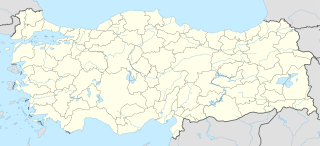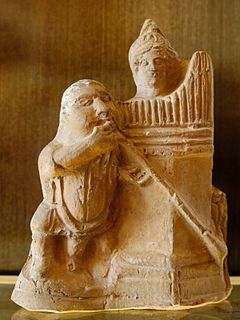
In Greek mythology, Agamemnon was a king of Mycenae, the son of King Atreus and Queen Aerope of Mycenae, the brother of Menelaus, the husband of Clytemnestra and the father of Iphigenia, Electra or Laodike (Λαοδίκη), Orestes and Chrysothemis. Legends make him the king of Mycenae or Argos, thought to be different names for the same area. When Helen, the wife of Menelaus, was taken to Troy by Paris, Agamemnon commanded the united Greek armed forces in the ensuing Trojan War.

Andriscus, also often referenced as Pseudo-Philip, was the last King of Macedon (r. 149–148 BC). A pretender, who claimed to be the son of Perseus of Macedon, he was a fuller from Adramyttium in Aeolis in western Anatolia. His reign lasted just one year.

Ares is the Greek god of war. He is one of the Twelve Olympians, the son of Zeus and Hera. In Greek literature, he often represents the physical or violent and untamed aspect of war, in contrast to his sister, the armored Athena, whose functions as a goddess of intelligence include military strategy and generalship.

Enyo was a goddess of war in Classical Greek mythology. She frequently is associated with the war god Ares, as a companion, sister, wife, or perhaps, mother.
In Greek mythology, Automedon, son of Diores, was Achilles' charioteer. In Homer's Iliad, he rides into battle once Patroclus dons Achilles's armor, commanding Achilles' horses Balius and Xanthos. After Patroclus dies, Automedon is driven to the rear of the battle, where he tries to console the bereaved horses.

The Battle of Thermopylae was fought between an alliance of Greek city-states, led by King Leonidas of Sparta, and the Persian Empire of Xerxes I over the course of three days, during the second Persian invasion of Greece. It took place simultaneously with the naval battle at Artemisium, in August or September 480 BC, at the narrow coastal pass of Thermopylae. The Persian invasion was a delayed response to the defeat of the first Persian invasion of Greece, which had been ended by the Athenian victory at the Battle of Marathon in 490 BC. By 480 BC Xerxes had amassed a huge army and navy, and set out to conquer all of Greece. The Athenian politician and general Themistocles had proposed that the allied Greeks block the advance of the Persian army at the pass of Thermopylae, and simultaneously block the Persian navy at the Straits of Artemisium.

Antigonia also transliterated as Antigonea and Antigoneia was a Hellenistic city in Seleucid Empire, Syria, on the Orontes, founded by Antigonus I Monophthalmus in 307 BC, and intended to be the capital of his empire; the site is approximately 7 km northeast of Antakya, Hatay Province, Turkey. After the Battle of Ipsus, 301 BC, in which Antigonus perished, the inhabitants of Antigonia were removed by his successful rival Seleucus I Nicator to the city of Antioch, which Seleucus founded a little lower down the river. Diodorus erroneously says that the inhabitants were removed to Seleucia Pieria. Antigonia continued, however, to exist, and is mentioned in the war with the Parthians after the defeat of Crassus.

A salpinx was a trumpet-like instrument of the ancient Greeks.
Calynda was a city in ancient Caria.
Echetlaeus or Echetlus (Ἔχετλος) was an ancient Athenian mythical hero of the Battle of Marathon with the Persians of the Achaemenid Empire. The latter name was also the name of a hero of ancient Thebes.
Ioannis Diakos was a Greek revolutionary leader during the Greek War of Independence. He was a chief of Pyrgos and battled during the Greek War of Independence and at the time, he was a general of Pyrgos. Petros Mitzos killed his father in 1823 in which that in the political battlefeld he also killed Stamatis Krestenitis.
Ioannis Krestenitis was a Greek revolutionary leader during the Greek War of Independence.
Lykourgos Krestenitis was a Greek politician during the early decades of the modern Greek state.

Nikolaos Petimezas was a Greek revolutionary leader during the Greek War of Independence, politician and officer of the Hellenic Gendarmerie.
The Battle of Doliana took place during the Greek War of Independence on 18 May 1821.

The Athenian military was the military force of Athens, one of the major city-states (poleis) off Ancient Greece. It was largely similar to other armies of the region – see Ancient Greek warfare.
In Greek mythology, the Amphillogiai were goddesses of disputes. Hesiod's Theogony identifies them as the daughters of Eris ("strife") and sisters of Ponos ("Hardship"), Lethe ("Forgetfulness"), Limos ("Starvation"), Algae ("Pains"), Hysminai ("Battles"), Makhai ("Wars"), Phonoi ("Murders"), Androktasiai (Manslaughters"), Neikea ("Quarrels"), Pseudea ("Lies"), Logoi ("Stories"), Dysnomia ("Anarchy"), Ate ("Ruin"), and Horkos ("Oath").
Stamatis is a given name and surname of Greek origin, a diminutive of Stamatios (Σταμάτιος). Notable people with the name Stamatis include:













